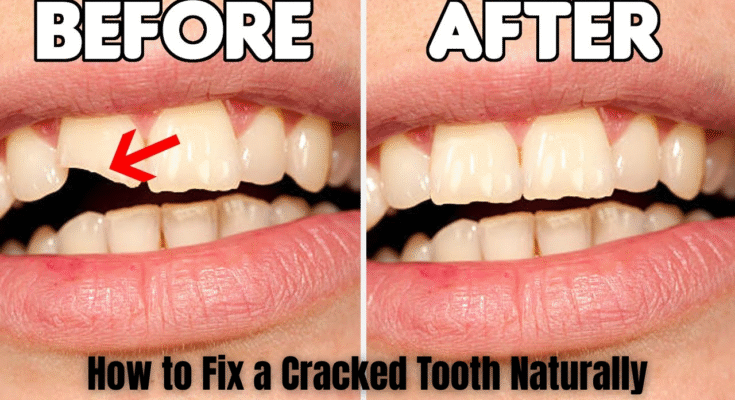Cracked teeth are a common dental problem that can lead to pain, sensitivity, and infection if not properly managed.
While some cracks require professional dental intervention, others, like superficial enamel fractures or craze lines, can be supported with natural methods.
In this detailed, guide, we’ll cover everything you need to know about how to fix a cracked tooth naturally: types, symptoms, home remedies, dietary strategies, lifestyle changes, and when professional help is non-negotiable.
Understanding Cracked Teeth: Types and Diagnosis
Before discussing natural treatment options, it’s essential to understand the nature and extent of the crack. Not all cracks are the same, and each type demands a different care strategy.

Types of Cracked Teeth:
- Craze Lines:
- Tiny cracks in the outer enamel.
- Common in adults; generally painless and cosmetic.
- Fractured Cusp:
- A piece of the chewing surface breaks off.
- Often occurs around dental fillings; may require bonding or crowns.
- Cracked Tooth:
- A visible or hidden crack extending toward the root.
- Can cause pain while chewing and sensitivity to temperature.
- Split Tooth:
- An advanced form of a cracked tooth.
- The tooth splits into two distinct segments—usually not restorable.
- Vertical Root Fracture:
- Starts at the root and progresses upward.
- Often asymptomatic until infection occurs.
See Also: How To Remove Wax From Car? 5 Best Ways To Do It Easily
Key Symptoms of a Cracked Tooth
- Sharp or intermittent pain while chewing
- Sensitivity to hot, cold, or sweet foods
- Gum swelling or redness
- Tooth mobility or visible cracks
Diagnosis often requires:
- Visual examination
- Dental dye or light testing
- Bite tests
- X-rays (though not all cracks are visible)
Can You Fix a Cracked Tooth Naturally?
Let’s clarify a crucial point: natural remedies cannot repair structural tooth damage like cracks that reach dentin or pulp. However, for minor enamel cracks, natural care can help:
- Alleviate pain
- Prevent bacterial growth
- Reduce inflammation
- Strengthen enamel
- Maintain oral hygiene
This makes natural care valuable for superficial damage, temporary pain relief, and as a complementary approach before or after professional care.
Suggested For You: How To Relieve Pain After Teeth Cleaning: A Detailed Guide
Natural Remedies for Cracked Tooth Relief
Here’s a list of scientifically backed and traditional remedies for managing a cracked tooth naturally:
1. Clove Oil (Eugenol)
- Acts as a local anesthetic and antibacterial.
- How to use: Soak a cotton swab in clove oil diluted with carrier oil (like coconut oil) and place it on the affected tooth for 10–15 minutes.
2. Saltwater Rinse
- Reduces bacterial load and inflammation.
- How to use: Mix ½ tsp of sea salt in a glass of warm water. Rinse for 30 seconds twice daily.
3. Turmeric Paste
- Contains curcumin, a natural anti-inflammatory.
- How to use: Mix turmeric with coconut oil into a paste. Apply to gums near the affected area.
4. Garlic
- Natural antibiotic and pain reliever.
- How to use: Crush a clove, apply to the crack for a few minutes, then rinse.
5. Aloe Vera Gel

- Soothes tissues and fights bacteria.
- How to use: Apply a small amount of food-grade aloe gel directly to gums.
6. Peppermint Tea Compress
- Provides a mild numbing effect.
- How to use: Cool a peppermint tea bag and place it on the cracked tooth.
7. Oil Pulling (Coconut or Sesame Oil)
- Detoxifies the mouth and supports gum health.
- How to use: Swish 1 tbsp of oil in the mouth for 10–20 minutes daily.
Diet & Nutrition to Support Tooth Healing
A tooth-healthy diet is essential to remineralize enamel and maintain oral structure. Focus on whole foods rich in vitamins and minerals:
Essential Nutrients
- Calcium: Dairy, leafy greens, sardines
- Vitamin D3: Sunlight, eggs, fortified foods
- Phosphorus: Fish, nuts, meat
- Magnesium: Legumes, seeds, dark chocolate
- Vitamin K2: Natto, hard cheeses, egg yolks
Beneficial Foods
- Bone broth (rich in collagen)
- Raw dairy products
- Leafy green vegetables
- Wild-caught fish and pastured eggs
Foods to Avoid
- Sugary snacks and beverages
- Acidic drinks like soda or citrus juices
- Hard and sticky foods that can worsen cracks
Lifestyle Adjustments to Prevent Worsening
Cracked teeth can worsen with poor habits or lack of care. Follow these lifestyle changes to prevent further damage:
- Avoid chewing on the cracked side
- Don’t chew ice, hard candies, or non-food objects
- Use a nightguard if you grind your teeth
- Maintain excellent oral hygiene
- Stay hydrated to support saliva production
- Quit smoking—it slows healing and increases infection risk
Natural vs. Professional Dental Care
| Aspect | Natural Remedies | Professional Dental Care |
|---|---|---|
| Function | Pain relief, bacterial control, inflammation management | Structural restoration, deep infection treatment |
| Best for | Craze lines, minor enamel cracks, supportive care | Cracked tooth, fractured cusp, root involvement |
| Limitations | Cannot heal cracks or restore integrity | May require invasive procedures (fillings, crowns) |
| When to choose | As first aid or complementary to treatment | For moderate to severe or worsening cracks |
When to See a Dentist
Even if you’re using natural methods, consult a dentist if:
- Pain persists or worsens
- You notice swelling or pus near the tooth
- The tooth becomes discolored
- There’s visible damage or separation
Professional intervention like bonding, crowns, or even root canals may be necessary to save the tooth.
Holistic & Alternative Dental Treatments
If you’re interested in integrative or holistic dental care, consider these complementary systems:
Ayurveda:
- Recommends oil pulling, neem twigs, and turmeric for oral detoxification and inflammation.
Homeopathy:
- Remedies like Arnica (for trauma), Hypericum (nerve pain), and Plantago (toothache relief) may offer symptom control.
Traditional Chinese Medicine (TCM):
- Uses acupuncture and herbal medicine to address systemic issues contributing to tooth weakness.
Acupressure Points:
LI4 (hand), ST6 (jaw), and SJ5 (forearm) can help manage tooth pain when massaged gently.
People also ask:
Can Coconut Oil Repair Cracked Teeth?
Coconut oil cannot “repair” a cracked tooth structurally, but it can reduce harmful bacteria and inflammation through oil pulling. This helps maintain oral hygiene and may prevent the crack from worsening.
How Long Does It Take for a Cracked Tooth to Heal Naturally?
Minor surface cracks may calm down in a few days to weeks with proper care, but true healing of a structural tooth crack doesn’t happen naturally. Natural remedies only manage symptoms and protect the tooth.
Does Drinking Milk Help with a Cracked Tooth?
Milk is rich in calcium and phosphorus, which support overall tooth health and remineralization. While it won’t fix the crack, it can be part of a supportive diet for dental strength.
Natural Tooth Repair Without Fillings Is It Possible?
Small enamel cracks may benefit from remineralization with good nutrition and hygiene. However, actual structural damage usually requires a filling or dental intervention to prevent further issues.
Best Essential Oils for Cracked or Broken Teeth?
Clove oil is the most effective, offering natural pain relief and antibacterial action. Peppermint, tea tree, and myrrh oils may also reduce inflammation and support oral health.
Is It Safe to Leave a Cracked Tooth Untreated?
Leaving a cracked tooth untreated can lead to infections, further breakage, and tooth loss. Even with mild symptoms, evaluation by a dentist is essential to avoid complications.
What Happens If You Ignore a Cracked Tooth?
The crack can deepen, allowing bacteria to enter the inner pulp, causing infection, abscesses, or eventual tooth loss. Early treatment is critical to preserving the tooth.




